 In Brief
In Brief  CoE Human Rights Commissioner Muizinieks: Protect Journalists from Attacks to Muzzle on Issues !
CoE Human Rights Commissioner Muizinieks: Protect Journalists from Attacks to Muzzle on Issues !
CoE Human Rights Commissioner Muizinieks: Protect Journalists from Attacks to Muzzle on Issues !
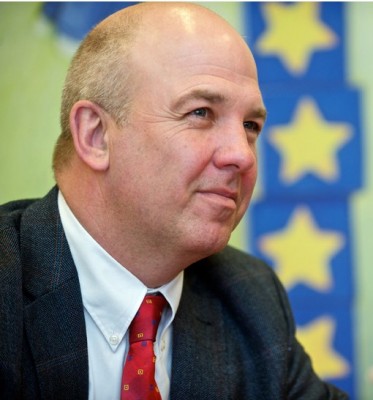
* "Journalists need Protection" from various "Attacks", "including in Europe", seeking "Censorship" against "Democracy", strongly declared the New PanEuropean Commissioner on Human Rights, Niels Muiznieks (2012-2018), just a few days after he replied to "EuroFora"s questions Internet Media Freedom and ECHR's Future (See: http://www.eurofora.net/newsflashes/news/coehumanrightscommissioneronwebmedia.html ), and the same Day that CoE's Committee of Ministers just started in Strasbourg to examine a crucial Semestrial meeting on ECHR judgements' application by all 47 Member States, including a review of numerous serious cases of Violations of Human Rights by Turkey (such as Torture, Murders, Arbitrary deprivations of Liberty, abusive Imprisonment, Harassments and/or Censorship, "Missing" People, etc, most Dating since the 1990ies, but partly "freezed" since 2009), notoriously pending for execution since too many years, in an interesting, well documented Viewpoint that "EuroFora" exceptionaly re-publishes, at variance to our general rule on Original only Journalism in News Reporting.
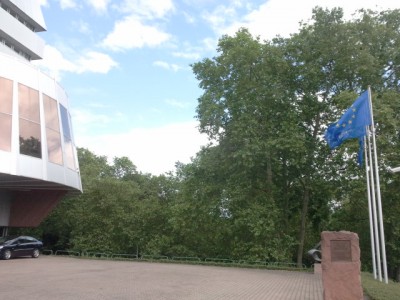
- The "intention" generaly is "to Shut them up and make them Stop doing their job, which can involve exposing Corruption, Abuse of power or Discrimination against various minorities. Media freedom is the lifeblood of a Democracy, as it is an essential prerequisite for other Freedoms as well, such as freedom of association or assembly", he denounced.
- Because "attacks on journalists are not like many other assaults, where the motive is frequently materialistic or racism. These are Political Attacks. As the OSCE Representative on Freedom of the Media, Dunja Mijatovic´, has recently written, “violence against journalists [..] remains a Special category of Crime, as it is a direct attack on Society and Democracy itself”.
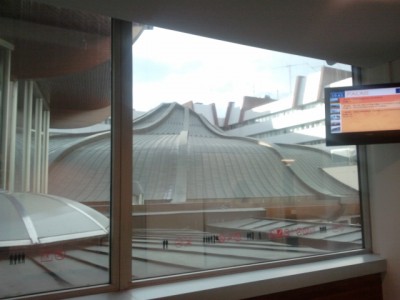
- That's why, all CoE's Member "States have a positive obligation to create a favourable environment for journalists to express their opinions without fear, no matter how uncomfortable those opinions may sometimes be to those with economic, cultural or political power", Muisnieks made it clear, citing the landmark "Dink v. Turkey judgment of the European Court of Human Rights", condemning Ankara on the ill-elucidated cold blood Murder of Armenian origin Web and paper Journalist Hrant Dink, (Comp. "EuroFora"s specific NewsReport on Dink's case at the ECHR, published since October 2010).
=> Therefore, "Governments and politicians need to signal very strongly that such Attacks are unacceptable and will not go unpunished. They need to initiate prompt, thorough and transparent Investigations and bring perpetrators to justice, where punishments should reflect the seriousness of this crime. If journalists have been threatened, the authorities should act quickly to protect them", CoE's New Human Rights Commissioner (2012-2018) stressed.
- Since, "even if a government does not engage in “old-fashioned” Censorship by screening and filtering media content, it can be involved in censorship if it does not take sufficient steps to combat violence against journalists. Impunity encourages repetition, which can be extremely damaging to free expression", he warned. For this reason, "a recent guidebook on the safety of journalists by the OSCE ... stresse(s) that “physical attacks and Threats of violence or Harm against journalists and members of their Family represent an extreme form of Censorship”.
- Indeed, "Journalism is a Dangerous profession, including in Europe", CoE's New PanEuropean Commissioner on Human Rights, responsible for 47 Countries, found on June 2012 :
- Among many other, older examples, only "since the beginning of this year (2012), journalists have suffered physical Attacks in Azerbaijan on a number of occasions, France, Germany, Greece, Italy, Latvia, Moldova, Montenegro, Romania and Russia.. ..What were these journalist-victims reporting on? In Azerbaijan, the story was the demolition of houses and evictions of residents for government sponsored urban redevelopment. In Romania and Russia, it was anti-government demonstrations. In France and Germany, it was Turkish-language media outlets reporting on the Kurdish minority in Turkey. In Italy, it was stories focusing on Mafia affairs. In Montenegro, it was a journalist probing shady dealings in a tobacco plant", (etc), he noted, pointing at the Diversity of "Hot" issues which may be covered by certain Media.
- "Often, the perpetrators of the attacks are unknown assailants, usually several masked men, but sometimes they have been riot police or state sponsored security guards". But "the attackers knew that their victims were journalists, who were sometimes wearing press badges or held cameras in their hands. In another case, the perpetrators mentioned the employer of the journalist as they beat him. In Latvia, in a brutally symbolic move, the assailants put a knife in the journalist’s mouth and sliced his cheek, grossly disfiguring him", he denounced.
- "A 1st Step is for Governments to treat violence targeting journalists as attacks against the core of our Democracies", and, therefore, "with the utmost Seriousness", Muiznieks urged.
- Because, f.ex., "those of us who witnessed the end of the Soviet Union remember well how glasnost’ or increased openness and Media liberalisation opened the floodgates for the emergence of Civil Society and political Pluralism" in Russia, he observed the Baltic-origin experienced European Top Official, as a Positive Change regarding Human Rights and Democracy, to be further developed and followed also elsewhere, mutatis-mutandis.
Main Menu
Home Press Deontology/Ethics 2009 Innovation Year EU endorses EuroFora's idea Multi-Lingual FORUM Subscribers/Donors FAQs Advanced search EuroFora supports Seabird newsitems In Brief European Headquarters' MAPs CoE Journalists Protection PlatformBRIEF NEWS
- 00:00 - 02.06.2021
- 00:00 - 18.10.2020
- 00:00 - 19.06.2020
- 00:00 - 18.05.2020
- 00:00 - 20.04.2020
- 00:00 - 02.02.2020
- 00:00 - 09.12.2019
- 00:00 - 27.11.2019
- 00:00 - 16.11.2019
Popular
- Yes, we could have prevented Ferguson riots says World Democracy Forum's Young American NGO to ERFRA
- Spanish People Elect CenterRIGHT Majority with 1st Party and Total of 178 MPs (6 More than the Left)
- Pflimlin's vision
- The European Athletic "Dream Team", after Barcelona 2010 Sport Championship Results
- Source Conseil d'Europe à ERFRA: Debatre Liberté d'Opposants à Loi livrant Mariage+Enfants à Homos ?
- Head of BioEthics InterGroup, MEP Peter Liese : "Embryonic stem cell research reaching its END" !?
- Spain: Jailed Turkish Terror suspect with Explosive,Drones,Chechen accomplices stirs Merah+ Burgas ?
- UN Head Ban Ki Moon at CoE World Democracy Forum : - "Listen to the People !"
Latest News
- EUOmbudsmen Conference 2022: Digital Gaps affect People's Trust threaten EF Project on EU Future ?
- French Election : Black Out on Virus, but Obligation for Fake 'Vaccines" Challenged
- Both French Presidential Candidates point at "Humanism" in crucial times...
- France : Zemmour = Outsider may become Game Changer in Presidential + Parliamentary Elections 2022
- PACE President Cox skips Turkey Worst (Occupation) case compared to Russia (DeMilitarisation) query
Statistics
Posetioci: 56807890Archive
Login Form
Other Menu
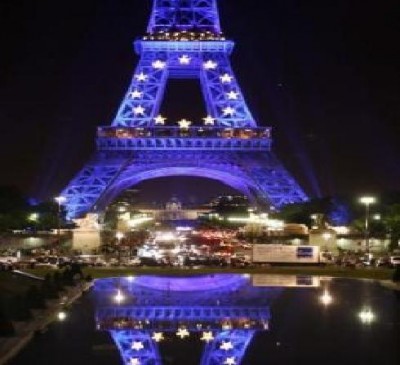
- "Europe must be liberated from this undermining "wooden talk" of a "unique thought" which hampers democratic debates", stressed incoming EU Chairman, French President Nicolas Sarkozy, speaking to Journalists after his official meeting with EU Commission's President, Jose Barroso, at Elysee Palace in Paris
- "It's precisely because there are not enough Debates, that EU hasn't managed yet to make it clear to European citizens what is really at stake", he added, in an obvious reference to the latest Irish "No" in 2008, after a long series of similar, unprecedented events, from the 1st Majority Abstention to EU Parliament's Elections in 1999, repeated in 2004, to the Dutch and French "No" in 2005, etc.
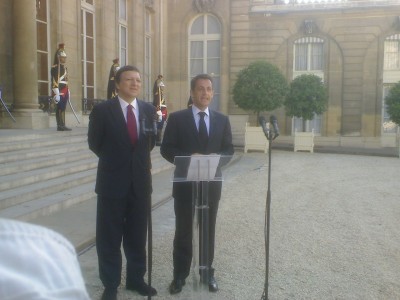
- "This is not an easy period, but we shall act with determination, while also listening to Citizens' views", he promised.
Sarkozy's move came shortly before his opening Speech, next week in EU Parliament in Strasbourg, for the first Public Debate on the Priorities of the French EU Presidency (July - December 2008), and that's one of the reasons for which he significantly opened his EU Council's Chairmanship by welcoming at Elysee palace EU Parliament's President, German MEP Hans Gert Poettering at first..
The incoming EU Chairman was replying to Press Questions about rumours that controversial British EU Commissioner on Trade, Mandelson, was alone to drop an invitation to have a working Diner at Elysee palace, together with all other EU Commissioners and the French Government, only because he would have been upset for some critical points made earlier by President Sarkozy in defense of European Agriculture vis-a-vis its Foreign competitors.
But, as smiling Sarkozy played down Mandelson's reported refusal to debate, saying that he had to visit Marseille for a Ministerial meeting on Trade the next morning, and that "all our British friends are always welcome to taste a nice diner" in France, perhaps at another occasion..
- "It's urgent to win anew the trust of the People" : Lately, "the European ideal lost its momentum. Since several years, whenever Citizens are questioned on Europe, they react with reserves : They even have .. a tendency to reply "NO".. After this 3rd "No" of a People in some years, there is an Urgency to convince", added French Prime Minister Francois Fillon, after a meeting earlier the same day of all Ministers with EU Commissioners, followed by an interview with Barroso
"According to recent Polls, only 30% of French people believe that the European construction is a source of hope. It's only a poll, but we all now quite well, that, since 2005, it's dangerous to neglect these alarming signals, as it would be dangerous to treat with contempt the Irish "No", Fillon warned.
"We all have a common duty to prove to the European Citizens who have doubts, that EU is more useful, more necessary, than ever" : And "that EU can take decisions needed in order to respond to European or Global challenges", the Prime Minister concluded.
- "We believe, together with President Sarkozy, that EU should open debates on all issues of direct, concrete interest to Citizens", confirmed later to EuroFora the Head of France's governing party (UMP), Patrick Devedjan, after his speech to the European People's party (EPP) Study Days in Paris (2 - 4 July 2008).
He didn't deny that one of them is Turkey : - "Public Opinion in France is very much unfavorable to Turkey's EU bid, and President Sarkozy has said that several times", he told EuroFora.
From European Central Bank's controversial policies on Euro's value, to EU Enlargement Strategy, etc., issues of obvious importance to EU Citizens will be plenty, next week in EU Parliament in Strasbourg, before President Sarkozy launches the debates on EU 2008 French chairmanship's priorities on Thursday.
Polls
SMF Recent Topics SA
- Record Hospitalisati... (0) Breadman
- How Many Infected by... (1) Thunderbird
- Real Cause for Europ... (0) Breadman
- Interesting Australi... (0) Aurora
- Plus de mRNA Faux-&q... (0) Aurora
- EU: Lukashenko as E... (0) WKalina
- Why NATO in Ukraine,... (0) Geopol
- Afghanistan's key : ... (0) Thunderbird
- Anti-Pass Demonstrat... (0) Aurora
- Veran - Fioraso : Mê... (1) JohnsonE


















